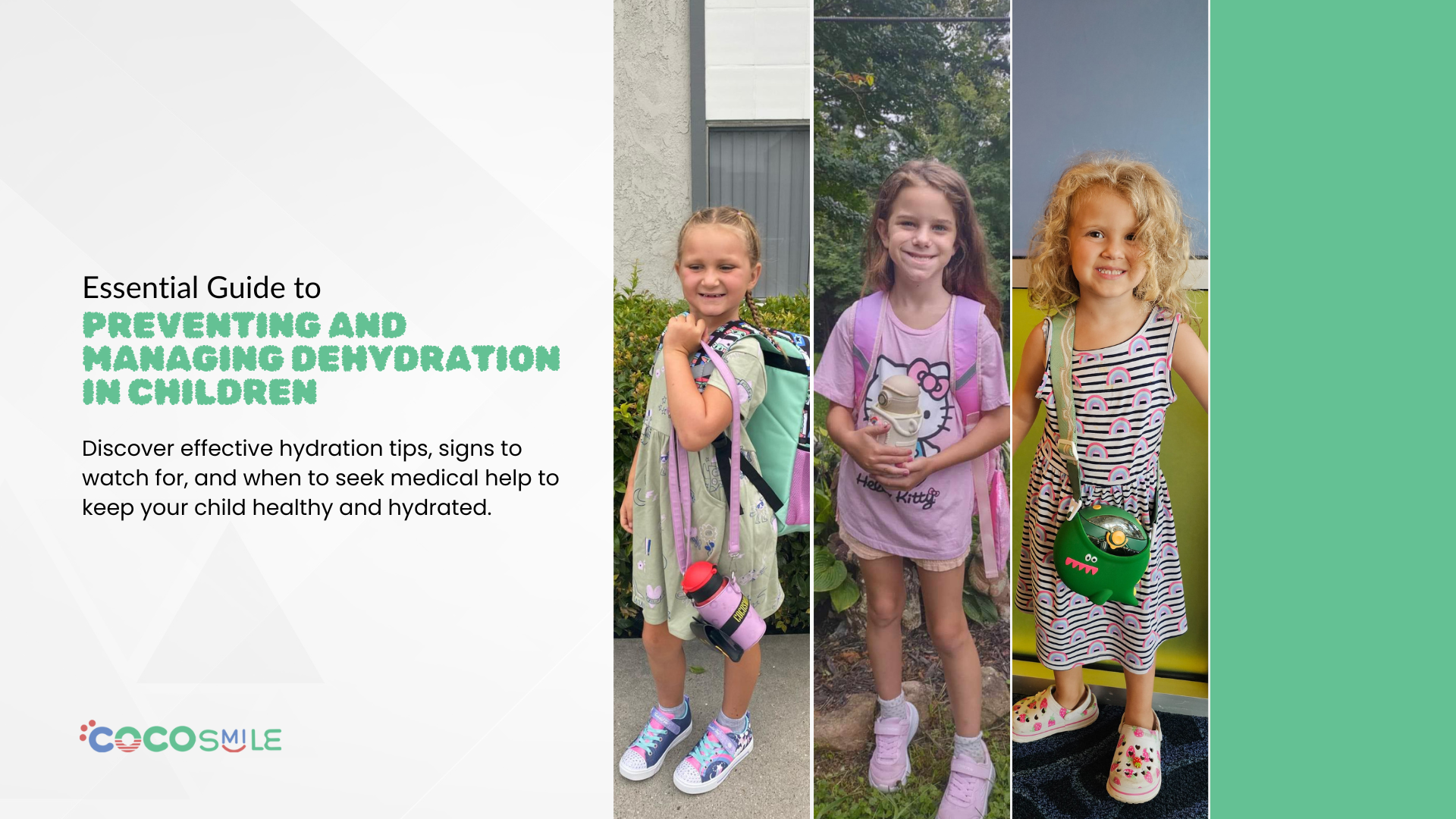Have you ever wondered why dehydration can hit children so hard?
Given that their bodies are composed of 50-70% water, even a slight dip in fluid levels can have serious consequences. Young children are particularly vulnerable due to their smaller body size and faster metabolism. Recognizing the signs of dehydration and knowing how to act quickly is crucial for preventing potentially severe health issues.
This blog provides:
- Signs and symptoms of dehydration in children
- Steps for treating dehydration at home
- When to seek medical attention
- Tips for preventing dehydration and encouraging hydration
What is Dehydration?
Dehydration occurs when the body loses more fluids than it takes in, leading to an insufficient amount of water to carry out normal functions. This can be due to various factors, including illness, high activity levels, and inadequate fluid intake. In children, common causes include vomiting, diarrhea, and not drinking enough fluids, particularly during illness or hot weather. Cocosmile cups are excellent tools to encourage consistent water intake and prevent dehydration.
Signs Your Child Might Be Dehydrated
Recognizing dehydration early is key to preventing more serious issues.
Mild to Moderate Dehydration
Children might play less than usual, appear irritable, and have dry mouths or lips. They might also cry with fewer tears and have sunken eyes. Another sign is reduced urination, which may be noticeable through fewer wet diapers or bathroom trips. Infants may show a sunken soft spot on their heads. Additionally, dizziness or light-headedness can occur, which might make them appear unsteady or clumsy.
Severe Dehydration
Severe dehydration is much more dangerous. Symptoms include extreme lethargy, rapid breathing, and cool or discolored hands and feet. Children may also show confusion, faint, or have not urinated for over 12 hours. In such cases, immediate medical attention is necessary.
What to Do if Your Child is Dehydrated?
If your child shows signs of mild dehydration, quick action can prevent it from becoming severe.
Treating Mild Dehydration at Home
Start by increasing fluid intake. Offer water frequently, or use oral rehydration solutions like Pedialyte. Avoid sugary or caffeinated drinks, as they can worsen dehydration. Electrolyte ice pops and diluted juices are good alternatives, especially if your child resists drinking water. For infants, continue breastfeeding or bottle-feeding, supplemented with water or Oral rehydration salts (ORS).
When to Seek Medical Help?
If symptoms persist or worsen, it’s crucial to contact a healthcare provider. Signs of severe dehydration, such as confusion, lack of urination for several hours, or vomiting bright-colored substances, indicate the need for immediate medical attention. Special care should be taken with infants under six months or children with chronic conditions, as they are at higher risk.
How to Prevent Dehydration in Children?
Prevention is key to mitigating the risks of dehydration. To ensure proper hydration:
- Consume fluids daily, particularly during hot weather or following physical activity.
- Maintain regular water intake during meals and throughout the day.
- Utilize a reusable, double-insulated water bottle to keep beverages accessible and at an optimal temperature.
- Serve water with meals and use Cocosmile cups for convenient hydration on the go.
Conclusion
Dehydration in children is a serious concern, but with proper knowledge and action, it can be effectively managed. Early detection and treatment are crucial to avoid severe complications. Always monitor your child’s fluid intake and be vigilant for signs of dehydration. Consult a healthcare professional if you have concerns about your child's hydration status. By using Cocosmile cups, you can help keep your child hydrated and healthy, ensuring they have the best chance to thrive.
FAQs
Why is it crucial to monitor my child's fluid intake daily?
Ensuring your child drinks enough fluids daily is essential because it helps maintain their hydration balance and supports their overall health. Children are particularly vulnerable to dehydration due to their smaller body size and higher metabolism, which means even a slight reduction in fluid levels can lead to serious health issues.
How can I effectively recognize signs of dehydration in my child?
Recognizing dehydration involves observing several key signs: mild to moderate dehydration may manifest as irritability, dry mouth, reduced urination, and sunken eyes, while severe dehydration might include extreme lethargy, rapid breathing, and confusion. By being vigilant for these symptoms, you can address dehydration promptly and prevent it from worsening.
What are the most effective ways to treat mild dehydration at home?
To manage mild dehydration, focus on increasing your child’s fluid intake. Offer water frequently and use oral rehydration solutions like Pedialyte when necessary. Avoid sugary or caffeinated beverages, as they can exacerbate dehydration. Electrolyte ice pops and diluted juices can also be beneficial. For infants, continue breastfeeding or bottle-feeding along with appropriate fluids.
When should I seek medical help for my child's dehydration?
Seek medical attention if your child exhibits severe dehydration symptoms, such as confusion, lack of urination for over 12 hours, or persistent vomiting. Immediate medical intervention is crucial in these cases to prevent further complications. Special attention should be given to infants under six months and children with chronic conditions, as they are at higher risk.
How can I prevent dehydration effectively in my child?
Prevention involves ensuring that your child consistently consumes adequate fluids. Encourage regular water intake, especially in hot weather, after exercise, or during illness. Using practical tools like a reusable, double-insulated water bottle and Cocosmile cups can help maintain hydration by making water more accessible and appealing.

Share:
Hydration Hacks: Fun Ways to Keep Kids Active and Drinking Water All Summer
Hydration Hacks for Young Athletes: Master the Balance for Peak Performance